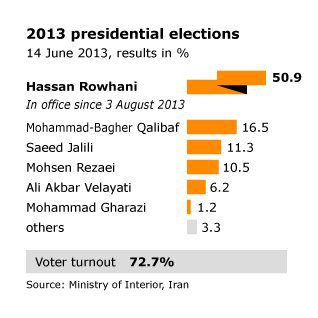
Introduction

In the run-up to Iran’s presidential elections, scheduled for 14 June 2013, a large number of candidates (672) either withdrew or were barred from running by the Guardian Council. In May, a list of eight candidates was finally approved by the Guardian Council. Mashaei was excluded from the list, as was former (reformist) President Ali Akbar Hashemi Rafsanjani. The Islahtalaban (‘Reformists’), weakened by the arrest of Mir Hussein Mousavi and Mehdi Karroubi in the aftermath of the 2009 presidential elections, backed centrist candidate Hassan Rowhani, the most moderate among conservative candidates. The sole reformist candidate, Mohammad Reza Aref, withdrew in favour of Rowhani, who drew support from former Presidents Rafsanjani and Khatami, and a centrist-reformist coalition was created. The Usulgarayan (‘Principalists’), conversely, were unable to rally behind a single candidate.
The elections turned out to be competitive. Rowhani received 52.4 percent of the votes – an absolute majority, rendering a second election round unnecessary. His victory clearly indicated a desire for change.
During his campaign, Rowhani promised to ease tensions with the West, end international sanctions, allow greater freedom of the press and reduce government interference in people’s lives. During the protests that erupted after the 2009 elections, Rowhani criticized the government for opposing what he saw as the people’s right to protest peacefully.
Principalist candidates (and favourites of the ruling establishment) performed poorly in the elections. Mohammad-Bagher Qalibaf, mayor of Tehran, received 17.1 percent of the votes; nuclear program negotiator Saeed Jalili 11.7 percent; Mohsen Rezaei, the former commander of the Islamic Revolutionary Guard Corps, won 11.1 percent; Ali Akbar Velayati, former Foreign Minister and adviser to the Supreme Leader, won 6.4 percent; and former minister Mohammad Gharazi 1.2 percent.
The voter turnout was 72.7 percent according to the Ministry of Interior. That is lower than the 2009 presidential elections (85 percent, Election Guide), but higher than the turnout during the first and the second round of the 2005 presidential elections (62.7 and 59.8 percent respectively, Election Guide).
Hassan Rowhani (2013-present)
Hassan Rowhani (born 1948), is an alim (cleric) who studied under prominent Shia scholars at the Qom Seminary (Iran). In addition he obtained a PhD degree in Law at the Glasgow Caledonian University (Scotland, United Kingdom).
Rowhani has been a key figure in Iran’s political system since the Revolution of 1979. He was a military commander during the Iraq-Iran War (1980-1988), member of Parliament, Secretary of the Supreme National Security Council from 1989-2005 (during which he had close ties with Presidents Ali Akbar Hashemi Rafsanjani and Mohammad Khatami), and member of the Assembly of Experts (which elects the Supreme Leader). As Iran’s chief nuclear negotiator (2003-2005), he managed to make progress with EU partners (Germany, France, Great Britain). As a result, Iran agreed in October 2003 to suspend its uranium enrichment programme and allowed tougher UN inspections. At the same time, Rowhani insisted on Iran’s right to maintain a nuclear enrichment programme intended for peaceful purposes, but stressed that expansion of this programme should not come at the expense of other economic development programmes. Rowhani resigned after Ahmadinejad took office in 2005, after which the course of negotiations changed significantly under top negotiator Saeed Jalili. Rowhani criticized his less accommodating approach towards the West.
Rowhani proved inclined towards reconciliation with neighbouring Arab countries when he first started reconciliation efforts towards the Gulf Cooperation Council (GCC) states in 1997. From 2005, he stressed Iran’s readiness to establish a regional cooperation system with Iraq and the GCC.
Rowhani’s victory has been cautiously received in the West. The US government declared it was ready to engage with Iran over its nuclear programme. European Union’s foreign policy chief Catherine Ashton said Iranians had given Rowhani a ‘strong mandate’ and said that she would be committed to working towards a solution of the nuclear issue. France and Great Britain gave similar statements.
Israel downplayed Rowhani’s election, stating that Iran would not change its nuclear policy – which is presented as an existential threat. Prime Minister Benjamin Netanyahu declared that sanctions would have to be boosted to increase pressure on Iran. Israel fears that a more moderate president will weaken the West’s resolve and its stance against Iran.
Reactions in the Arab world, where public opinion towards Iran has turned increasingly hostile in recent years, were cautious as well. Saudi Arabia congratulated Rowhani – a departure from earlier confrontational statements towards Iran. As Saudi Arabia is bent on domestic stability – given its restive Shiite minority in the eastern province – normalization with Iran is key. The Bahraini government, which has accused Iran of meddling in its internal affairs, said that change is not expected in view of the fact that Rowhani is part of the establishment.
Syria’s main opposition group, the Syrian National Coalition, urged the new Iranian leadership to retract its continued support for Bashar al-Assad’s regime. However, Syrian opposition activists expressed little hope that any change will occur .
Reactions within Iran have generally been hopeful. Former President Khatami advised reformists to be patient regarding the pace in which changes are implemented.
Rowhani was installed as President on 3 August 2013.

